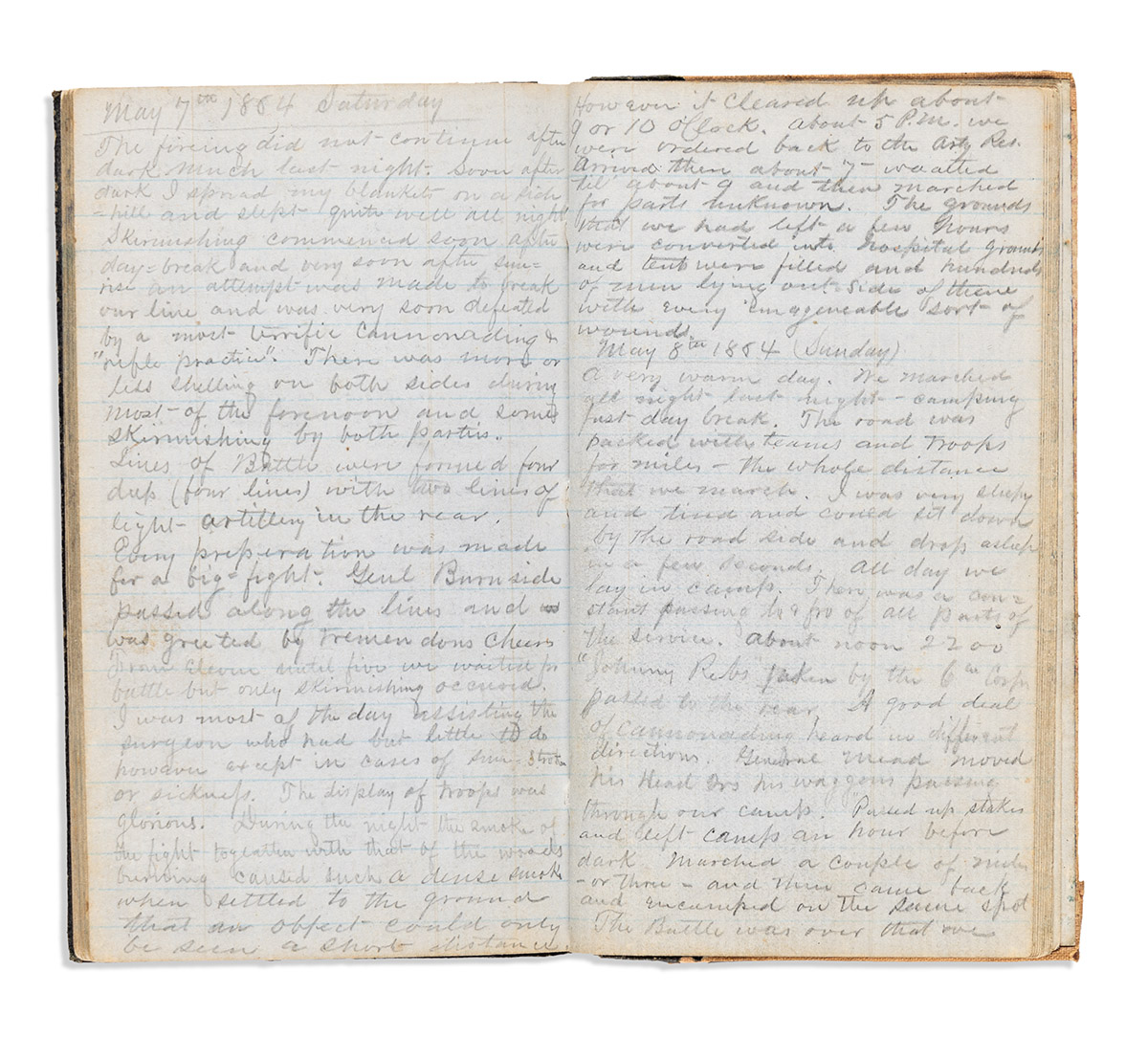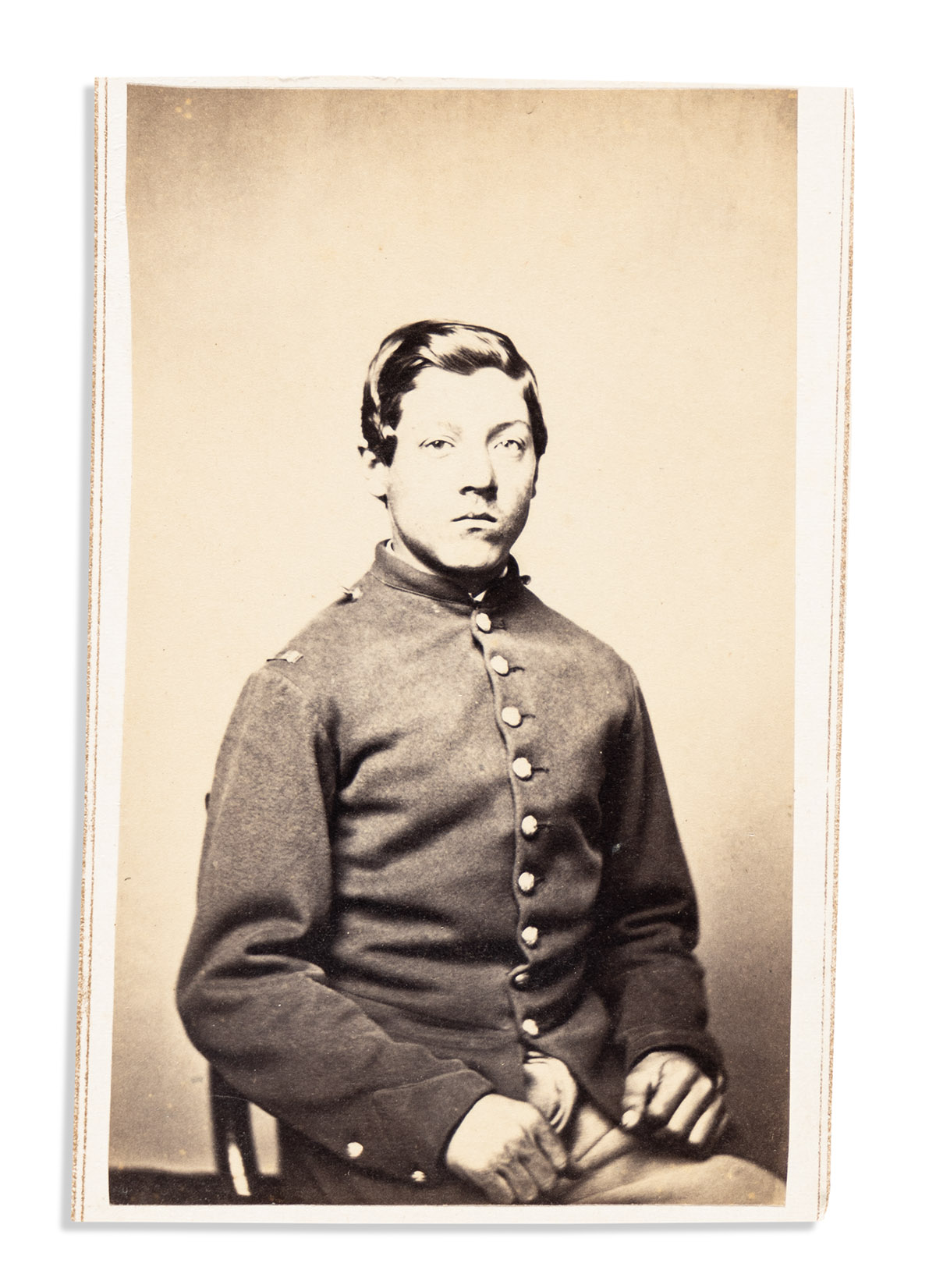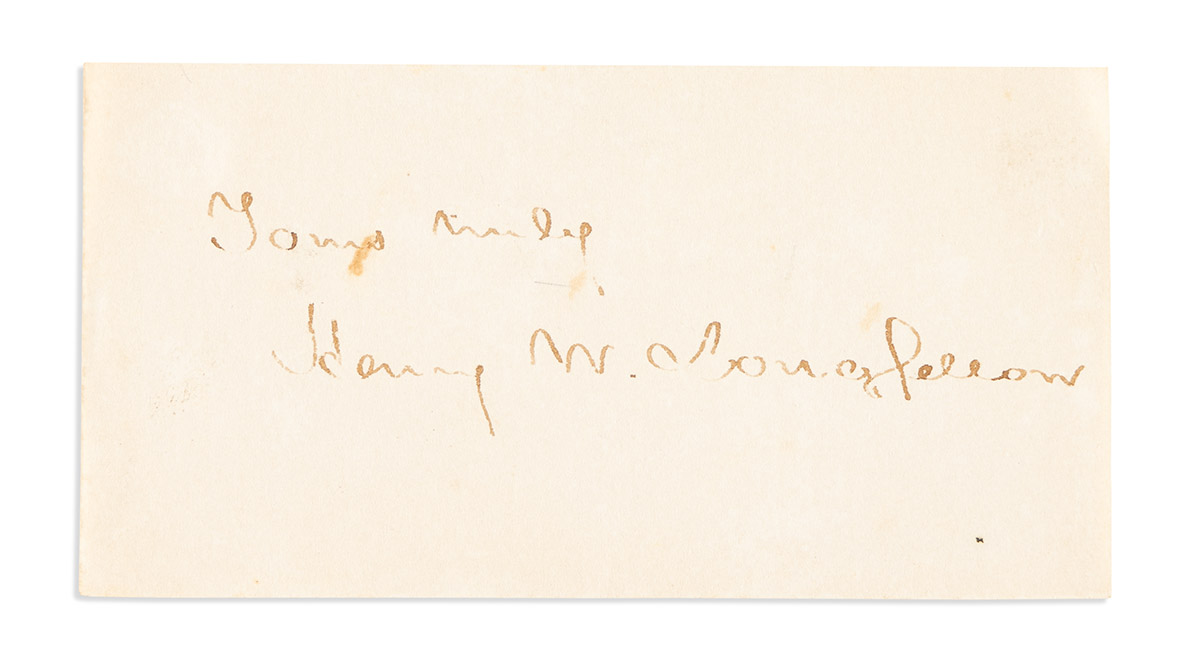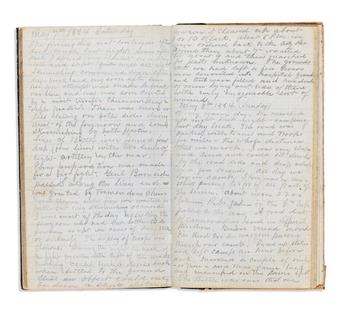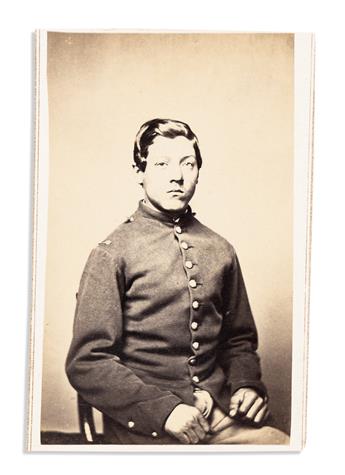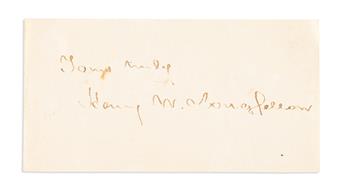Sale 2646 - Lot 139
Price Realized: $ 1,600
Price Realized: $ 2,000
?Final Price Realized includes Buyer’s Premium added to Hammer Price
Estimate: $ 1,000 - $ 1,500
(CIVIL WAR--NEW YORK.) W. Everett Clark. Diary of a hurried wedding, and service at the Wilderness and Spotsylvania. [97] manuscript diary pages plus [13] pages of memoranda. 12mo, original limp cloth, minor wear, resewn; written in pencil in a small but tidy hand, a bit faint in some passages. Various places, 2 September 1863 to 14 May 1864
Additional Details
William Everett Clark (1838-1912) was raised in rural Oneida County, NY, youngest son of industrialist Erastus Clark. By 1863, he was living in Queens County on Long Island, where he enlisted as a private in the 15th New York Heavy Artillery, and spent the next two weeks courting a Hempstead schoolteacher named Anna Martin (born circa 1838), daughter of a paper manufacturer. At noon on 29 September 1863, Clark learned that he was being called up to the front, effective immediately: "I got permission to go to Hempstead and went forthwith. Proceeded immediately to Mr. Martin. Found that Anna had gone to N.Y. by the 2:40 train. Abe went to H to meet the next train while I dressed. Most fortunately Anna went to 147 Chatham St. [the recruiting office] where she saw Lieut. Barton & from him learned what turn affairs had taken. She started back immediately & found Abe waiting for her at the depot. Abe took her home and then went to Freeport after Mr. Hundale (Rev.). James & I proceeded to Mr. Martin's soon after, the Rev. made his appearance, and without much delay Anna Martin & I (Ev Clark) were made man & wife." He took a train the next morning to begin making his preparations for Army service, noting that "yesterday's performance was very sudden to all, even myself."
Clark joined his new regiment at Fort Lyon in Arlington, VA on 6 October: "Found most of the reg't composed of Germans. Most all of the officers are, and many of their orders are given in their own language." The regiment spent the next several months on garrison duty in the defense of Washington. On 1 December, "witnessed the punishment of pick pockets. Tied up to the end of the guard house by wrists and ankles, standing on tip-toe, with a sign board on him 'Pick Pocket.' After a few hours of this punishment he had a ball and chain riveted to his ankles." On 10 December, he remarked that the First Lieutenant "shows himself a brute every day of his life. He is a tyrant and very overbearing." He was more impressed by the commanding general during an inspection: "Gen'l Grant was rather a good looking individual and was surrounded by some fine-looking officers" (18 April 1864).
The regiment's peace was broken with marching orders on 3 May 1864, and they soon joined Grant's Overland Campaign: "On every road within miles could be seen troops--infantry, cavalry, and artillery, or waggon trains, pontoon trains or ammunition trains. One of the strange things . . . was the immense amount of waste. Blankets, coats (dress and over) underclothing and many things of value, which were strewn thickly for miles on the road as we passed along. Bearing no arms, I made a point to destroy as many of them by cutting & tearing as I could" (4 May). At the Battle of the Wilderness on 6 May, his brigade "lost several men killed and drownded. It was a horrid sight to see the hundreds of poor mutilated human creatures as they were met going to the rear. . . . The woods for miles were on fire." While cooling off in a stream, "a shell burst nearly exactly over my head, and I double-quicked it out of the range." The next evening, as the fighting wound down, "the smoke of the fight together with that of the woods burning caused such a dense smoke when settled to the ground than an object could only be seen a short distance." That evening, he added a note at the front of his diary: "Should a stray bullet or an impudent portion of a shell or any other mishap put an end to my existence during these uncertain times, the finder of this will incur the everlasting gratitude of the friends of the owner and the blessing of a dead comrad by mailing it to the following address."
On 9 May, he heard the preparations for the Battle of Spotsylvania Court House: "I listened to a conversation concerning probable future movements of the enemy between Generals Meade, Grant & Hancock." He found himself in the thick of combat on 12 May: "The scenes I saw here disgusted me with war. It was terrible!!! The grones of the wounded dying, the dead, the mangled mutilated human beings were all horrible sights to behold. The balls and shells were constantly flying all about me, and death seemed to stare everyone in the face." On 14 May, he saw "the mud was nearly hub deep, and it was horrible to see the poor men, horses and mules struggle to get through it. . . . Ambulances reached for miles. The wounded men were being taken to Fredericksburg. Many of them died and were buried by the roadside." At this point, Clark ran out of blank spaces in his diary, so his narrative came to an end. He survived the war, returned home to Anna, and was a retail grocer in Jamaica, NY through at least 1880.
With--4 items tucked into the rear pocket, including the business card of his regiment's Manhattan recruiting officers led by Captain Calvin Shaffer (named as his recruiter on 21 September 1863); uncaptioned carte de visite portrait of a private in uniform (presumably Clark); military pass issued to Clark in January 1865; and (rather randomly) a signed slip of paper: "Yours truly, Henry W. Longfellow."
Clark joined his new regiment at Fort Lyon in Arlington, VA on 6 October: "Found most of the reg't composed of Germans. Most all of the officers are, and many of their orders are given in their own language." The regiment spent the next several months on garrison duty in the defense of Washington. On 1 December, "witnessed the punishment of pick pockets. Tied up to the end of the guard house by wrists and ankles, standing on tip-toe, with a sign board on him 'Pick Pocket.' After a few hours of this punishment he had a ball and chain riveted to his ankles." On 10 December, he remarked that the First Lieutenant "shows himself a brute every day of his life. He is a tyrant and very overbearing." He was more impressed by the commanding general during an inspection: "Gen'l Grant was rather a good looking individual and was surrounded by some fine-looking officers" (18 April 1864).
The regiment's peace was broken with marching orders on 3 May 1864, and they soon joined Grant's Overland Campaign: "On every road within miles could be seen troops--infantry, cavalry, and artillery, or waggon trains, pontoon trains or ammunition trains. One of the strange things . . . was the immense amount of waste. Blankets, coats (dress and over) underclothing and many things of value, which were strewn thickly for miles on the road as we passed along. Bearing no arms, I made a point to destroy as many of them by cutting & tearing as I could" (4 May). At the Battle of the Wilderness on 6 May, his brigade "lost several men killed and drownded. It was a horrid sight to see the hundreds of poor mutilated human creatures as they were met going to the rear. . . . The woods for miles were on fire." While cooling off in a stream, "a shell burst nearly exactly over my head, and I double-quicked it out of the range." The next evening, as the fighting wound down, "the smoke of the fight together with that of the woods burning caused such a dense smoke when settled to the ground than an object could only be seen a short distance." That evening, he added a note at the front of his diary: "Should a stray bullet or an impudent portion of a shell or any other mishap put an end to my existence during these uncertain times, the finder of this will incur the everlasting gratitude of the friends of the owner and the blessing of a dead comrad by mailing it to the following address."
On 9 May, he heard the preparations for the Battle of Spotsylvania Court House: "I listened to a conversation concerning probable future movements of the enemy between Generals Meade, Grant & Hancock." He found himself in the thick of combat on 12 May: "The scenes I saw here disgusted me with war. It was terrible!!! The grones of the wounded dying, the dead, the mangled mutilated human beings were all horrible sights to behold. The balls and shells were constantly flying all about me, and death seemed to stare everyone in the face." On 14 May, he saw "the mud was nearly hub deep, and it was horrible to see the poor men, horses and mules struggle to get through it. . . . Ambulances reached for miles. The wounded men were being taken to Fredericksburg. Many of them died and were buried by the roadside." At this point, Clark ran out of blank spaces in his diary, so his narrative came to an end. He survived the war, returned home to Anna, and was a retail grocer in Jamaica, NY through at least 1880.
With--4 items tucked into the rear pocket, including the business card of his regiment's Manhattan recruiting officers led by Captain Calvin Shaffer (named as his recruiter on 21 September 1863); uncaptioned carte de visite portrait of a private in uniform (presumably Clark); military pass issued to Clark in January 1865; and (rather randomly) a signed slip of paper: "Yours truly, Henry W. Longfellow."
Exhibition Hours
Exhibition Hours
Aliquam vulputate ornare congue. Vestibulum maximus, libero in placerat faucibus, risus nisl molestie massa, ut maximus metus lectus vel lorem.



